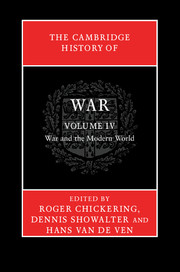Part II - The Era of Total War, 1914–1945
Published online by Cambridge University Press: 05 December 2012
Summary
Introduction to Part II
The war that began in 1914 in Europe quickly took a direction that few observers had anticipated. The failure of the great German offensive in northern France in September 1914 triggered tactical and strategic dynamics that produced an ineluctable stalemate in the central theater of conflict. The sheer scale of fighting produced similar results in other theaters and suggested a terrible conclusion: this war could not be won on the battlefield. As the generals struggled with the new dimensions of combat, the belligerent states were compelled to mobilize their civilian societies to sate the war’s vast appetites for material and human resources. The war’s demands began to encompass everyone in the belligerent states.
The results were not only unanticipated but also profoundly disorienting. The challenge now faced by participants of all descriptions was to make sense of these developments, to find the proper terms with which to endow them with historical significance, once words like “battle,” “heroism,” “sacrifice,” and “progress,” and “triumph” began to fail as guides to events. The desperate search for tactical innovation and strategic alternatives to overcome the stalemate was a central part of the story. Meanwhile, civilian leaders struggled to build not only a managerial, but also a conceptual apparatus that would be equal to the new challenges they faced. It bespoke the magnitude of these challenges that few civilian leaders from the war’s first days were still in office when the great “remobilizations” took place late in the conflict, bringing resolute and ruthless men to power whose understanding of “war” itself had been honed in the bitter circumstances – the surprises, disappointments, disillusionments, and paradoxes – of the great struggle.
- Type
- Chapter
- Information
- The Cambridge History of War , pp. 181 - 191Publisher: Cambridge University PressPrint publication year: 2012



